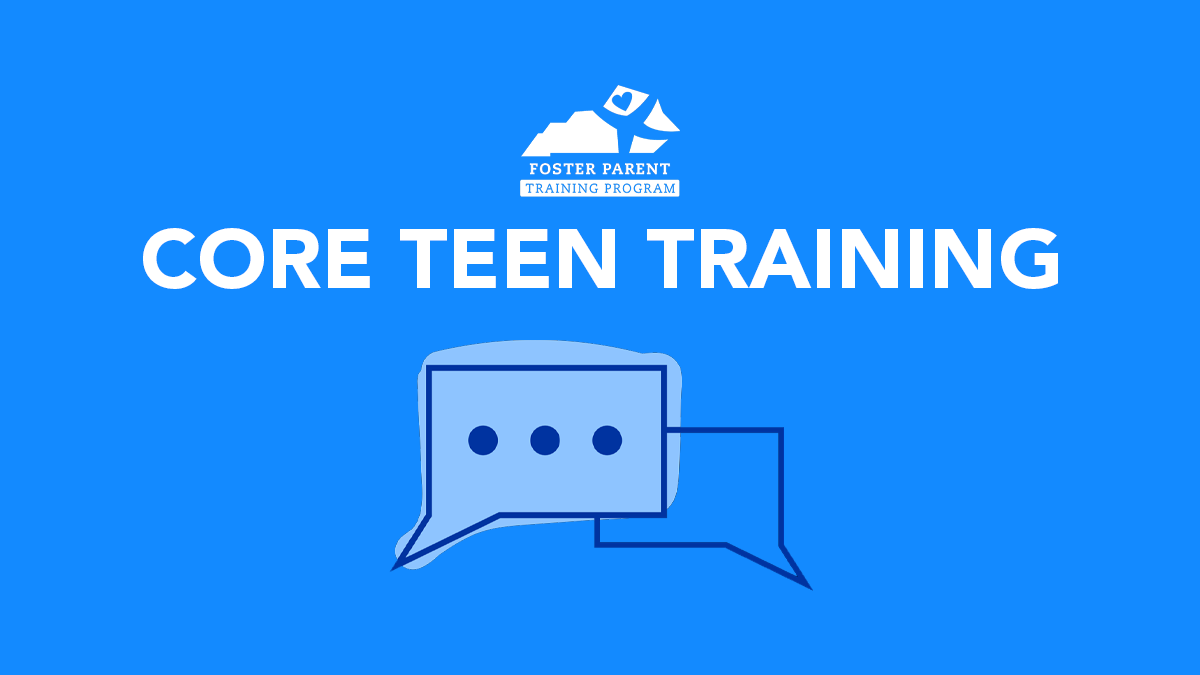
- This event has passed.
Nurturing Youth’s Cultural / Racial / Ethnic Needs And Sexual Orientation / Gender Identity
February 2, 2023 @ 6:30 pm - 8:30 pm EST

CORE TEEN (Critical On-going Resource Family Education)
Session 4
Nurturing Youth’s Cultural / Racial / Ethnic Needs and Sexual Orientation / Gender Identity
February 2, 2023
6:30 pm-9:00 pm EST
Via Zoom
Carla Jordan, MS
2.5 credit hours
Navigating the teen years can be challenging. It’s even more difficult for youth that have experienced trauma. The University of Kentucky in collaboration with DCBS, will offer training to equip foster and adoptive parents to meet the needs of older youth who have moderate to serious emotional and behavioral health challenges.
For many years the child welfare system has struggled with disproportionate numbers of youth of color involved in the system.
- In 2018, Black children represented 14% of the total child population but 23% of all kids in foster care. Latino and Hispanic children represent 25% of kids nationwide yet just 21% of all kids in foster care.
- Children that identify as African American, Latino, or any marginalized community are at an increased risk for trauma exposure and subsequent development of PTSD.
- These populations face higher rates of psychosocial disparities such as poverty, lack of education, barriers to health and mental health services, and exposure to multiple stressors such as discrimination, racism, community violence exposure, and immigration and acculturation stresses. (Pumariega, A.J., Jo, Y., Beck, B. et al., 2022). Being in foster care is traumatic in itself.
However, an added layer of trauma is present for African American and Latino-American youth that identify as LGBTQ+.
- Lesbian, gay, bisexual, transgender, or questioning (LGBTQ) adolescents contend with violence directed at them in response to suspicion about or declaration of their sexual orientation and gender identity. It is one of the leading causes of homelessness for youth due to familial conflict resulting from coming out (Truecolorsunited.org/our-issue/).
- Findings from the GLSSEN 2019 National School Climate Survey demonstrate that Kentucky Schools were not safe for most lesbian, gay, bisexual, transgender, and queer (LGBTQ) secondary school students. In addition, many LGBTQ students in Kentucky did not have access to important school resources, such as Gender and Sexuality Alliances/Gay-Straight Alliances (GSAs) or similar student clubs and were not protected by supportive and inclusive school policies. The most recent Climate Survey Report further supports that schools nationwide have negative school climates whereas youth that identify as LGBTQ+ often face discriminatory practices and violence. (GLSEN, 2022). A hostile school climate affects students’ academic success and mental health. LGBTQ+ students who experience victimization and discrimination at school have worse educational outcomes and poorer psychological well-being
Parents with increased knowledge of diversity, equity, inclusion, awareness and belonging are better able to help foster youth achieve greater outcomes. During this session, parents will help to mitigate the effects of trauma by gaining a sound understanding of how to nurture their youth’s cultural/racial/ethnicity and sexual orientation/gender identity and expression. More specifically participants will be able to:
- Identify their personal bias and discover ways to eliminate bias by “unpacking their knapsack” through self-directed coursework.
- Identify ways to incorporate the youth’s race, culture, and ethnicity into family life.
- Demonstrate two skills in communicating acceptance and support for youth who are questioning their sexuality or gender identity and/or identify as LGBTQ2S (Lesbian, Gay, Bisexual, Transgender, Questioning or Queer, 2 Spirit).
To learn more about this program, please feel free to contact Carla Jordan, TRC Training Specialist, at carla.jordan@uky.edu or 1-833-859-3278 (1-833-UKY-FAST)
Please note each session is approved for ongoing, elective training credit for Kentucky Foster Parents. This program also meets the requirements for CarePlus Training. Basic & Advanced Foster Parents, Fictive Kin Foster Parents, Care Plus, or Therapeutic Foster Parents can all take advantage of the opportunity to fulfill their training hours. A reliable internet connection and computer/smartphone with webcam are required.

